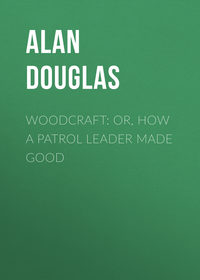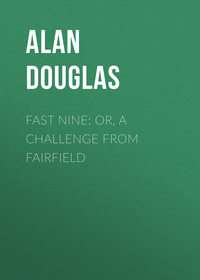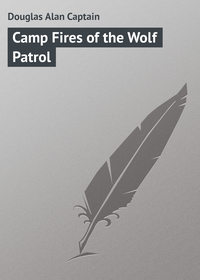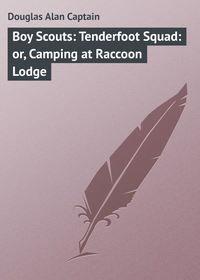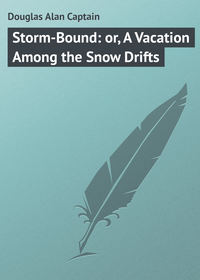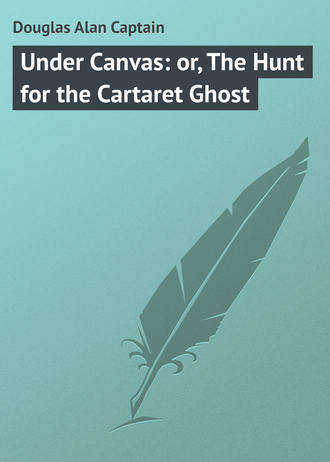 полная версия
полная версияUnder Canvas: or, The Hunt for the Cartaret Ghost

Douglas Alan, Captain
Under Canvas; or, The Hunt for the Cartaret Ghost
CHAPTER I
OUT FOR SHELL-BARKS
"Toby, we must be half-way there now; don't you think so?"
"Guess you're right about that, Mr. Scout Master; as near as I can calculate."
"Glad to hear you say so, Toby, because, excuse me for saying it, but until I hear something that sounds like business I'm all up in the air. I've known you to fool your trusting scout comrades before this."
"There you go, George Robbins, suspicious as ever. No wonder they call you Doubting George. You never will believe anything till you see it with your own eyes, and then you often wonder whether you're awake or dreaming. Now, I told Elmer here, our Assistant Scout Master, about my plan, and he took my word for it."
"That's all right, Toby, but unfortunately I was born different; I'm not so trusting, and things are mighty deceptive in this world, sometimes."
A fourth boy of the party in the big wagon broke into the conversation at this point, by laughing hoarsely, and going on to remark, with a decided lisp:
"I bet you were, George; and I can thee you looking up at the doctor and thaying the very first thing: 'The moon ain't made of green cheeth; and I won't b'lieve it till you prove the thame to me, tho there!'"
"Hold on, Ted Burgoyne, don't fall all over yourself about my shortcomings; I'm not the only pebble on the beach when it comes to that; there are others. But to return to the subject. Toby, here are three of us burning up with curiosity to know where you're piloting this shell-bark hickory nut-gathering expedition. You let it out to Elmer in the start, but the rest of us don't know a thing about it. You promised to open up when we'd got far enough along the road so there wouldn't be any turning back. And there was something said about half-way; so now's your chance."
"I can see you all looking my way," remarked the fifth boy in khaki, with a peculiar little drawl, quite musical, to his voice, that stamped him of Southern birth; "and to hurry things up I move to make the request unanimous."
"There, you heard what Chatz Maxfield said, Toby; take the cover off, and tell us where this wonderful bonanza lies. You promised that we'd get every sack we're carrying along filled to the brim with dandy chestnuts, hickories, and black walnuts. Why all this mystery? It looks mighty suspicious to me – excuse me for saying it."
These five lads, sturdy looking chaps all of them, belonged to the Hickory Ridge Troop of Boy Scouts, Elmer, Ted, Toby and Chatz to the Wolf Patrol, and George to the Beaver. The troop was in a flourishing condition, since both patrols had their full quota of eight members, and a third one, called the Eagle, was almost complete.
Elmer Chenowith had long been leader of the Wolf Patrol, and being a full fledged first-class scout he had quite some time back secured from Scout Headquarters his certificate enabling him to act as Assistant Scout Master in the absence of the young man, Mr. Roderic Garrabrant, who usually fulfilled the duties of that important office.
These bright, wideawake lads, with others of their chums, had seen considerable in the way of excitement during the preceding summer. Some of their adventures and victories have already been placed before the readers of this Series of scout books in preceding volumes, so that an extended introduction to Elmer and his four comrades is hardly necessary here. What has been said has only been for the benefit of such readers as are making their acquaintance for the first time.
It was on a Saturday morning in Fall that they were driving over the road some four miles away from the home town. A sharp frost on the preceding night was just the thing to make nutting a success, for it helped open the burrs on the chestnut trees, as well as caused the hickory nuts and black walnuts to drop.
Just before Thanksgiving holidays boys may be expected to develop a feverish longing for an outing of some sort. It had struck these scouts in full force when Toby Jones confided to them that he knew a place where almost unlimited amounts of splendid nuts were to be gathered with very little trouble, only he declined to reveal his secret until they were well on the road.
The consequence was that he had three boys guessing for the balance of the week; and plaguing the life out of him in the endeavor to coax him to tell. But Toby was nothing if not stubborn, and he only shut those jaws of his tighter, and waved the tempters away with the remark that some people called him a clam because he knew how to keep his lips closed.
Toby was himself driving the big strong horse between the shafts of the wagon. The conveyance belonged to his father, and it sometimes took all of Toby's strength to hold the frisky animal in.
Toby's middle name was Ellsworth, given to him because his grandfather had in the Civil War been connected with a regiment of Zouaves under the famous colonel whose death at Alexandria, Virginia, occurred just about the time hostilities opened between the North and the South.
Toby was a strange boy in many ways. He cherished a burning desire to become a celebrated aëronaut, and by means of some wonderful invention that would turn the world upside-down make the name of Jones famous. As yet, however, Toby had only succeeded in patching up several supposed-to-be flying machines, which had managed to give him a few rough tumbles, though luckily not any broken bones. His chums never knew what he would spring on them next, for he was constantly grappling with puzzling questions connected with the science of aviation, and deploring the fact that there was always something magnificent just ahead of him that seemed to be eluding his eager clutch like a will-o'-the-wisp in the swamp.
Ted Burgoyne had the misfortune to possess a hare-lip, which made him lisp. He was not so sturdy in build as some of his mates, but as smart as they make them, and with a decided leaning for the profession of a doctor. Indeed, such was the extent of his knowledge of surgery and medicine that he often went by the name of "Doctor Ted." And having had occasion to perform certain necessary operations along the line of setting broken limbs, and bandaging severed arteries, his work had been commended by several professional M.D.'s as marvelous.
When Doubting George made that last plea of his the driver turned his head and looked at his companions. He saw an eager glow in the eyes of the trio who had been kept in the dark up to that moment with regard to their mysterious destination.
"Well, we've got along so far that it ain't likely anybody'll want to turn back, and show the white feather," he observed, with a quick glance directly at Chatz Maxfield; "so here goes. We're headed right now for the old Cartaret place!"
"Whew! Cartaret's Folly they call it, because the man who built the same sank a fortune there making it beautiful, and then the owls and rats took charge, which was all of twenty years ago, I reckon!" George went on to say, first whistling to mark the surprise he felt over the disclosure.
"And there's a lot of talk going around to this day about ghosts being seen in the windows and around the grounds of that deserted place; but most people would say that's only old women's stories. All the same those people who don't believe in spooks and goblins and all such things couldn't be hired for any amount of money to camp out in that big house for just one dark night."
It was Chatz who made this assertion. All of his chums knew that Chatz had a deep-rooted vein of superstition in his system, which it seemed impossible for him to get rid of. He believed in spirits coming back to haunt graveyards, and empty houses where perhaps some violence had once occurred. Elmer and other scouts had laughed at him many times, and Chatz even took himself to task because of his weakness, which he had probably imbibed through association as a small child with colored pickaninnies down on the plantation in South Carolina. Sometimes he boldly declared he was done with such childish beliefs; but when an occasion chanced to come along bearing on the subject it was strange how Chatz again found himself standing up for his old-time faith in hobgoblins, and the efficacy of the left hind-foot of a rabbit shot in a graveyard in the dark of the moon, to ward off evil influences, and repel the power of spooks to do bodily harm.
It was well known that many people shunned the vicinity of the old Cartaret place, some eight miles away from Hickory Ridge, because queer stories passed current concerning white figures seen stalking about the weed-grown grounds, and looking out of the open windows of the ruined house. That was why Toby had been wise enough to keep his secret until they were so far on the road that there was little likelihood of any boy venturing to propose that they abandon the nutting expedition and return home.
"Well, I knew some of you fellows would be saying that," he now remarked; "so I asked Elmer about it, and he advised me to bottle up till we'd gone half-way to the place. So now, I hope nobody wants to go back?"
"Oh! you needn't look at me that way, Toby," Chatz hastened to exclaim; "p'raps I may be silly enough to believe in ghosts, but nobody ever called me a coward; and where the rest of you go, suh, Chatz Maxfield can be counted on to follow."
"Me too!" chirped Ted.
"P'raps now you may remember that once before we ran foul of a haunted place up at that old mill," remarked George, "and it turned out to be only a bunch of game-fish poachers at work there. I never did take much stock in ghosts."
"You never take much stock in anything, suh, I notice, till you've pulled the same to pieces, and examined it all ovah," the Southern scout told him, quickly.
"Then it theems that you know about the thupply of nuts up at the old Cartaret place, do you, Toby?" asked Ted.
"I asked a man who was sent up there only a couple of weeks back by the lawyers that have the estate in charge, to look it over and see if it was worth while to try and repair the ruined house. And say, he told me he never saw trees loaded with such a crop of dandy nuts as there were in that woods back of the house. You never heard of any fellows going up there to gather hickories, did you? I guess nobody ever goes inside half a mile of the place if they c'n help it. And Elmer, he fell in with my scheme right away. Besides, you see, I'm taking something with me that I hope to get a chance to try out on this trip," and Toby pointed back to a mysterious bundle lying in the bed of the wagon, on the many gunny-sacks that had been brought along in order to hold the anticipated harvest of nuts for winter use.
"Well, well, well!" George exclaimed, in his skeptical way, "now chances are that's some other foolish invention of yours, Toby – a new kind of flying machine that'll drop you ker-plunk in a frog pond, or crack your head on a log when you try it out."
"Nothing'd ever be accomplished in this world if everybody had your doubting nature, George," the driver of the wagon told him; "I happen to be built on a different model, and p'raps you may live long enough to hear the name of Jones go thundering along the pathway of fame on everybody's lips."
"Mebbe I will," George told him, "because they say it's getting mighty near as common as Smith. But I'd better not say that when my cousin Landy Smith is around. I only hope this don't turn out a hoax, that's all. It's going to be an all day trip, and I'd hate to be sold, and come back with one measly bag of poor little nuts to be divided among five."
"Well, now that you know the dreadful dark secret, and nobody says turn back home," Toby announced, with a broad grin, "I'm goin' to invite the whole bunch to stop off at this wayside grocery at the crossroads here, and have some sarsaparilla with me. It's my treat this time."
As the road had been more or less dusty, and their throats were accordingly somewhat parched in consequence, there was no dissenting voice heard to this generous proposition.
"Plenty of time to gather all the nuts we want, and then make an early start for home," Elmer told them, as Toby pulled near a series of posts where the horse could be securely hitched.
"And the best of it is that we've thought to fetch some stuff along so we can build a fire and have a cooked dinner," George went on to say, with a pleased smile; for while he might be given to doubting many things, he never had occasion to question his appetite as every one knew – that was always in positive evidence.
All of them jumped from the wagon, which had two seats, so that three boys could sit behind, and one with the driver. While Toby was doing the needful with his hitching halter made of rope, the others stretched their legs, and waited, because it would be hardly proper for them to troop into the road grocery ahead of the scout who had invited them to join him in a refreshing drink.
A hulking boy was leaning against the fence near by, and observing the five scouts in a leering sort of way.
"Huh! that's Angus McDowd, one of that Fairfield bunch we beat at baseball last summer," muttered Toby, as he happened to glance over, and noticed the other observing them with a sneer on his face.
"Never liked him for a thent!" Ted was heard to say in a low cautious tone; for the other boy was a strapping big chap, and if provoked might give them more or less trouble, in a desire to fight them one after the other, as he had the reputation of being something of a bruiser.
"My stars! but he was mad that day we won the game, though, let me tell you, suh!" observed Chatz; "and he did his level best to get in a scrap with some of our fellows. Felix Wagner and Tom Ballinger had to lead him away, you remember. He doesn't like the boys of Hickory Ridge any too well, believe me, fellows."
They all went inside the little dusty-looking building, where some enterprising man had started a wayside grocery, and general store, at which you could purchase nearly anything from a paper of needles to a coffin, or an automobile tire, and gasoline.
Fortunately the man happened to have some stray bottles of soft drinks like sarsaparilla and root beer that must have been left over from his summer trade; and presently each of the scouts was washing the dust down his throat.
Altogether they may have spent about ten minutes in the store; and then after Toby had settled the account, they again passed out to the wagon.
The loitering Fairfield boy had disappeared, as Elmer noted when he looked over toward the fence where Angus McDowd had been standing on their arrival.
"Now, what ails you for a silly thing, Nancy?" said Toby, as the mare laid back her ears, and pranced at their approach. "Been getting too much oats lately, I reckon, with too little exercise. Well, you won't be feeling so fresh and frisky by the time we get back home to-night. That load of nuts is going to make you puff, let me tell you. Pile in, fellows, while I unfasten the hitching rope. Whoa! there, don't you dare try to bite me, you horse with the nasty temper! Why, this is a new trick for you to show. Grab the lines, won't you, Elmer? The blame nag's that anxious to show off she'd leave me in the lurch! Let up, there, can't you?"
It was only by making a hasty jump that agile Toby managed to gain his seat, to take the taut lines from Elmer's hands. Immediately the mare commenced to rear up in a most remarkable manner. Then, taking the bit between her teeth, she started along the road, fortunately in the right direction, at a whirlwind pace, amidst a cloud of dust, and with the three scouts who had been sitting on the second seat tumbling around in a heap in the bed of the wagon, all of them having been thrown backward.
Even as the grocery keeper came running out of the door to see what was the matter, and while they were still within hearing distance of the place, Elmer felt sure he saw a head rise into view above the pig-pen situated on one side of the road, and could recognize the grinning face of that Fairfield loafer, Angus McDowd.
There was no time to say anything. The mare was undoubtedly running away, and the wagon flinging from side to side in the road, as Toby stood half erect, pulling with might and main on the lines in the endeavor to hold the frantic animal in.
It began to look like croaking George might have been right when he said he doubted whether the nutting expedition would be much of a success.
CHAPTER II
WHAT HAPPENED ON THE ROAD
"Hold her in, Toby!" George was heard to shout, as he floundered around in the midst of the gunny sacks, with the other two scouts straddling him half the time.
"Whoop! we ain't in thuch a hurry ath all that, Toby. Get a grip on the linth, Elmer, and help him pull. Oh! what a quack I got then on my head. I bet you I'll have a lump ath big ath a gooth egg! Quit clawing me, George; I can't help it if I do climb all over you. Look at the way the wagon thwings, would you?"
Elmer did not need to be told that it was his duty to assist Toby control the runaway animal. No matter what the cause of the beast's strange fright might turn out to be, their first business was to drag so heavily on the lines that Nancy would have to moderate her wild pace.
Accordingly both of the boys pulled and sawed and jerked until the mare was made to come to a full stop. This occurred fully a mile away from the wayside grocery, which was long ago lost to sight behind several bends in the road.
"Jump out and hold her, some of you other fellows!" gasped Toby, short of breath after his violent exertions.
Chatz, George and Ted all hastened to obey. They had been tumbled around in the bed of the big wagon at such a lively rate that they were only too glad of the chance to gain their feet. Held by a stout boy on either side the mare did not offer to run further, though still acting very strangely.
Elmer had once spent some time up on an uncle's ranch in Northwest Canada; and knew a heap about horses. He had sometimes seen animals act this way, and had before then guessed what might be the matter.
"Hold her steady, everybody, and let me look around a little," was what he called, as he jumped down, and began patting the sweaty back of the trembling animal.
A minute later and they heard him give an angry exclamation.
"I thought as much," Elmer was saying, as he held up his hand; "look what was fixed under her tail."
"Say, that seems like a bunch of those nasty little sand spurs that sting and poison like all get-out!" exclaimed George, and it might have been noticed that this time he showed no signs of his customary doubting spirit.
"Just what they are," Elmer went on to say, indignation in his whole manner.
"But how – when – where?" began Ted, when Chatz burst out with:
"He did it, Elmer, that skunk of a McDowd. Must have thought it'd be a fine way to pay back what he believed he owed the Hickory Ridge boys. The low-down coward, to hurt a hoss that way."
"But why, he might have made some of us get thrown out, and hurt right bad in the bargain!" exclaimed George, angrily.
"Much he'd have cared for that," Toby panted; "and didn't I just think I heard a silly laugh at the time Nancy started to rear up, and prance like a crazy thing? That must a been Angus. And like as not he's doubled up back there right now laughing over seeing how we got thrown around in the wagon because of his sand spur trick. For five cents I'd turn around, and go back to give him the licking he needs."
"Don't bother thinking about that," Elmer told him. "It was a mean trick, and I've known men to get a halter out on the plains for playing that same game. But we got out of the hole without any damage, only to our feelings; so let's forget it."
The others were usually swayed more or less by what Elmer thought or did. He was a natural leader, and it had become second nature for the other scouts to look to him for advice, whenever an emergency arose.
"Guess the poor frightened thing'll stand now, fellows, without holding her any more," Toby suggested; "so climb back on your seat; and be more careful next time how you let go your hold. It's a wonder none of you got dumped out when you tilted over backward."
Just as he said, the animal seemed to have partly recovered from her mad fright occasioned by the pain the little sharp-pointed burrs inflicted. Though still trembling, and acting in a skittish manner, she gave signs of being docile enough to be driven.
The three scouts hastened to climb in at the back of the wagon, and after securing the gunny sacks, as well as the large package belonging to Toby, they once more found seats for themselves. George and Chatz, however, it might be noticed, made sure to get a firm grip somewhere on the side of the wagon; while Ted, being in the middle, threw an arm around each of his chums, as though he depended on them to sustain him, should another runaway occur.
They were soon going along at a fair clip, though Toby had to "lean" pretty heavily on the lines in order to hold the big bay mare in, for he did not think it advisable to let her have her head again. The next time she made such a mad spurt as that they might not find it so easy to get her to stop.
"What d'ye reckon possessed that coward to play such a mean trick on us?" Toby wanted to know.
"Oh! he had it in him, that's all, and when the chance came around he just couldn't help himself," Elmer told him, for the Assistant Scout Master was somewhat of a philosophical boy, and able to figure out things that might puzzle some of his tent mates.
"Next time I see that Angus he'll hear my opinion of a sneak who could play a dirty trick like that!" continued the driver, vigorously.
"Thame here!" chirped Ted. "And if he giveth me any thath I'll pull hith red noth for him, thee if I don't."
"All I can say is, keep your eye out for sledge hammer punches if ever you go to pulling his nose," warned George; "because he's a born scrapper, and would as soon fight as eat."
"Let's forget about that little affair," suggested Elmer; "no use crying over spilt milk, and what's done can't be undone. Toby, suppose you tell us a little more about this nut grove up at the old Cartaret place; because if I remember rightly you said you'd been asking everybody all about the estate."
"Why, old Judge Cartaret, the rich man who built up the place, meaning to live there with his young and handsome wife, went crazy, they say, after he'd found her dead in her room. The mystery never was cleared up. To this day some people say she was murdered by a man she once promised to marry before the millionaire judge came along; another lot seem to believe she committed suicide because the judge was so cruel, and wouldn't let her leave the place; and one man told me he always had believed ever since he was a boy that the judge struck her down in a fit of passion. But of course those things don't cut any figure with us."
"On the contrary," interrupted Chatz, who had been listening to all these horrors with wide-open eyes, and a look of intense interest on his dark face, "they strike me as being decidedly interesting, suh. If I had a chance I'd like to investigate this queer thing, and perhaps learn what did happen in that big house ever so many years ago."
"But how about the nut treeth, Toby, did the judge plant the thame when he wath trying to make a thut-in paradith for that pretty bride of hith?"
"That's just what he did, boys, so they told me," Toby continued, readily consenting to be squeezed for information; "he planted a whole lot of chestnuts, walnuts and shell-bark hickories that have been growing for several dozen years. They're busting big trees, and just breaking down with the finest crop ever known, and with never a single fellow brave enough up to this time to go there and gather the harvest. Why, when I heard what that man had to say about it, I was fairly wild to be off. And believe me, boys, we'll make the eyes of the other fellows stick out of their heads like fun when they see what an enormous supply of nuts we've gathered for next winter around the fire. Yum! yum! I always did say that a plate of red-cheeked apples, a dish of fresh popped corn, and a pocketful of nuts beats all creation on a stormy night, winter times."


